

How to Demonstrate Respect at Work. Change Management. Change management is basically the science, or possibly art, of managing yourself and others during a period of change.
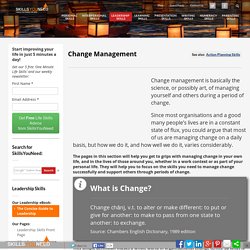
Since most organisations and a good many people’s lives are in a constant state of flux, you could argue that most of us are managing change on a daily basis, but how we do it, and how well we do it, varies considerably. Keeping your professional development continuous. Do you remember leaving school or university and thinking that exams and assessments would be a thing of the past?
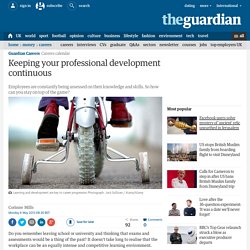
It doesn't take long to realise that the workplace can be an equally intense and competitive learning environment. Whether we like it or not, employees are constantly being judged on their capabilities and benchmarked against their peers. And, unlike studying for a qualification, the goalposts in the workplace keep moving. This might be because of new technology, customer demand, legislation or simply because there is a new chief executive with a different vision. All these changes invariably have implications for the staff. Some organisations are good at providing learning opportunities when they can see a direct benefit to the organisation.
According to the 2012 Learning Survey by Niace, the adult learning organisation, there's a strong correlation between learning and sustained employment. Enhancing your performance Benchmarking the job market Knowledge updating. Six Steps to Building Trust in the Workplace. By Pat Mayfield, for Yahoo!
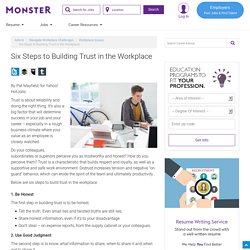
HotJobs Trust is about reliability and doing the right thing. Building Trust Inside Your Team - Management Skills From MindTools.com. Creating a Strong, Cohesive Group © iStockphotoBorisJovanovic19 A strong, cohesive team can achieve anything.

You may be deceived if you trust too much, but you will live in torment if you don't trust enough. – Frank Crane, American minister and author. Personal Goal Setting - How to Set SMART Goals - from MindTools.com. Planning to Live Your Life Your Way Learn how to set effective personal goals.
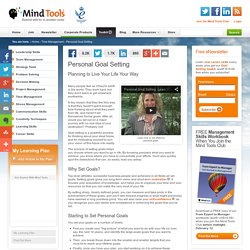
Many people feel as if they're adrift in the world. They work hard, but they don't seem to get anywhere worthwhile. A key reason that they feel this way is that they haven't spent enough time thinking about what they want from life, and haven't set themselves formal goals. After all, would you set out on a major journey with no real idea of your destination? Goal setting is a powerful process for thinking about your ideal future, and for motivating yourself to turn your vision of this future into reality. Decision-making and problem-solving techniques, skills and methods. Decision-making process Define and clarify the issue - does it warrant action?
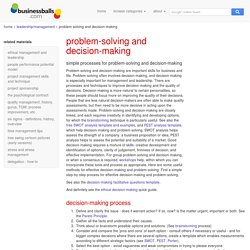
If so, now? Is the matter urgent, important or both. See the Pareto Principle. Gather all the facts and understand their causes. Effective Decision Making. People often say that they find it hard to make decisions.
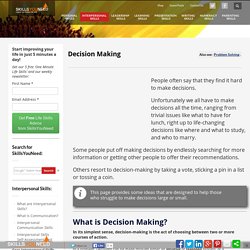
Unfortunately we all have to make decisions all the time, ranging from trivial issues like what to have for lunch, right up to life-changing decisions like where and what to study, and who to marry. Some people put off making decisions by endlessly searching for more information or getting other people to offer their recommendations. Others resort to decision-making by taking a vote, sticking a pin in a list or tossing a coin. This page provides some ideas that are designed to help those who struggle to make decisions large or small. What is Decision Making? In its simplest sense, decision-making is the act of choosing between two or more courses of action. In the wider process of problem-solving, decision-making involves choosing between possible solutions to a problem. Intuition Intuition is using your ‘gut feeling’ about possible courses of action.
Reasoning. 10 tips for dealing with change in the workplace. 10-megabyte hard disks...
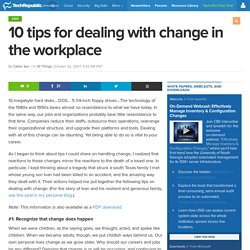
DOS... 5 1/4-inch floppy drives....The technology of the 1980s and 1990s bears almost no resemblance to what we have today. In the same way, our jobs and organizations probably bear little resemblance to that time. Companies reduce their staffs, outsource their operations, rearrange their organizational structure, and upgrade their platforms and tools. Dealing with all of this change can be daunting. Yet being able to do so is vital to your career. As I began to think about tips I could share on handling change, I realized that reactions to those changes mirror the reactions to the death of a loved one. Importance of Professional Development in the Workplace. This is an age of stiff and cut-throat competition.
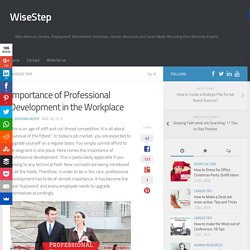
It is all about “Survival of the fittest”. In today’s job market, you are expected to upgrade yourself on a regular basis. You simply cannot afford to be stagnant in one place. Here comes the importance of professional development. Take Charge of Your Professional Development. It's easy to get complacent about professional development when you're employed.

If you already have a job, why should you go above and beyond to improve your skills, especially if it's not required by your company? But making an effort to help yourself grow professionally will help you succeed, both in the short term and in the long term.